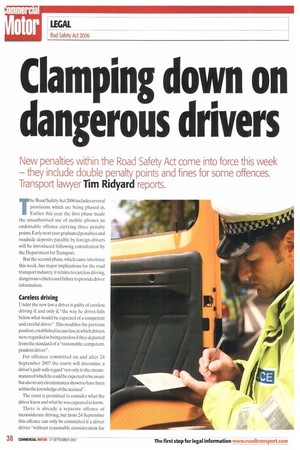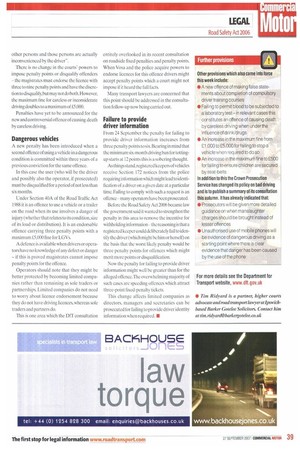Clamping down on dangerous drivers
Page 38

Page 39

If you've noticed an error in this article please click here to report it so we can fix it.
New penalties within the Road Safety Act come into force this week
— they include double penalty points and fines for some offences.
Transport lawyer Tim Ridyard reports.
The Road Safety Act 2006 includes several provisions which are being phased in. Earlier this year the first phase made the unauthorised use of mobile phones an endorsable offence carrying three penalty points. Early next year graduated penalties and roadside deposits payable by foreign drivers will be introduced following consultation by the Department for Transport.
But the second phase, which came into force this week, has major implications for the road transport industry:it relates to careless driving, dangerous vehicles and failure to provide driver information.
Careless driving Under the new law a driver is guilty of careless driving if, and only if, "the way he drives falls below what would be expected of a competent and careful driver-. This modifies the previous position,established in case law, in which drivers were regarded as being careless if they departed from the standard of a "reasonable, competent. prudent driver".
For offences committed on and after 24 September 2007 the courts will determine a driver's guilt with regard "not only to the circumstances of which he could be expected to be aware but also to any circumstances shown to have been within the knowledge of the accused".
The court is permitted to consider what the driver knew and what he was expected to know.
There is already a separate offence of inconsiderate driving, but from 24 September this offence can only be committed if a driver drives "without reasonable consideration for other persons and those persons are actually inconvenienced by the driver".
There is no change in the courts' powers to impose penalty points or disqualify offenders — the magistrates must endorse the licence with three to nine penalty points and have the discretion to disqualify,but may not do both. However, the maximum line for careless or inconsiderate driving doubles to a maximum of f.5,000.
Penalties have yet to be announced for the new and controversial offence of causing death by careless driving.
Dangerous vehicles A new penalty has been introduced when a second offence of using a vehicle in a dangerous condition is committed within three years of a previous conviction for the same offence.
In this case the user (who will be the driver and possibly also the operator, if prosecuted) must be disqualified for a period of not less than six months.
Under Section 40A of the Road Traffic Act 1988 it is an offence to use a vehicle or a trailer on the road when its use involves a danger of injury (whether that relates to its condition, size of its load or distribution). It is an endorsable offence carrying three penalty points with a maximum £5,000 fine for LGVs.
A defence is available when drivers or operators have no knowledge of any defect or danger — if this is proved magistrates cannot impose penalty points for the offence.
Operators should note that they might be better protected by becoming limited companies rather than remaining as sole traders or partnerships. Limited companies do not need to worry about licence endorsement because they do not have driving licences, whereas sole traders and partners do.
This is one area which the DfT consultation entirely overlooked in its recent consultation on roadside fixed penalties and penalty points. When Vosa and the police acquire powers to endorse licences for this offence drivers might accept penalty points which a court might not impose if it heard the full facts.
Many transport lawyers are concerned that this point should be addressed in the consultation follow-up now being carried out.
Failure to provide driver information From 24 September the penalty for failing to provide driver information increases from three penalty points to six. Bearing in mind that the minimum six-month driving ban for tottingup starts at 12 points this is a sobering thought.
As things stand, registered keepers of vehicles receive Section 172 notices from the police requiring information which might lead to identification of a driver on a given date at a particular time. Failing to comply with such a request is an offence —many operators have been prosecuted.
Before the Road Safety Act 2006 became law the government said it wanted to strengthen the penalty in this area to remove the incentive for withholding information—the reasoning is that a registered keeper could deliberately fail to identify the driver (which might be him or herself) on the basis that the worst likely penalty would be three penalty points for offences which might merit more points or disqualification.
Now the penalty for failing to provide driver information might well be greater than for the alleged offence."Ibe overwhelming majority of such cases are speeding offences which attract three-point fixed-penalty tickets.
This change affects limited companies as directors, managers and secretaries can be prosecuted for failing to provide driver identity information when required. •


























































































































































































